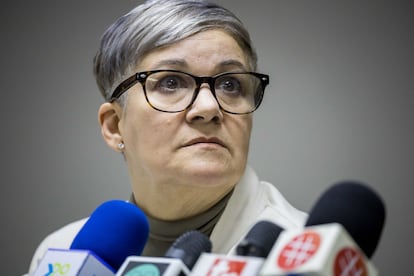Colombia confirms that Chavista dissident María Alejandra Díaz has had asylum for seven months.


The Colombian Foreign Ministry confirmed this Wednesday that it granted diplomatic asylum last January to lawyer María Alejandra Díaz Marín, who had taken refuge in its embassy in Caracas. This response came in response to the complaint filed by the Chavista activist and lawyer, now a critic of Nicolás Maduro's government, that she was staying at the Colombian ambassador's residence awaiting a safe-conduct permit that would allow her to leave the country under protection, a precaution Díaz demands after experiencing judicial persecution and police siege at her home.
"The Venezuelan government, through various diplomatic channels, has stated that, in the case of Ms. Díaz Marín, the issuance of a safe-conduct pass is not necessary since there is no arrest warrant or open judicial process against her," they stated in a statement.
The Colombian government is now warning that Díaz, at his own risk, violated "the conditions agreed upon when granting diplomatic asylum," having denounced his situation on social media this Tuesday. "Since his arrival at the Official Residence, the Colombian Diplomatic Mission in Caracas has granted him, and will continue to grant him, due protection and adequate conditions of residence."
Díaz had stated that she had never received formal notification of her asylum, but rather verbal communications. She filed the complaint after her case was included in the latest report by the United Nations Special Rapporteur on the independence of judges and magistrates, presented at the end of July. In her statement, Díaz demanded that the Venezuelan government provide her with a safe-conduct permit to leave the country safely.
As in other cases of persecution of its critics, the Venezuelan government has denied the existence of court orders against figures it finds inconvenient, even as it deploys its entire intelligence apparatus. Most arrests of opponents in Venezuela occur without warrants or formal notifications from the courts regarding the opening of investigations.
The Colombian statement adds that Gustavo Petro's government "will continue to promote frank and respectful dialogue with Venezuela, with a view to exploring alternatives to resolve this situation as quickly as possible, always in compliance with international standards."
Díaz withdrew his support for the ruling Chavismo a few years ago. Along with several leftist leaders, revolutionary militants, communists, and other moderate groups, he formed the Popular Democratic Front, a critic of the authoritarian trend of the Chavismo they had previously supported.
At the end of 2024, she was severely punished for filing an appeal for protection before the Supreme Court of Justice demanding that the National Electoral Council publish the minutes and disaggregated results of the July 28 presidential elections, which are still not officially known. The highest court declared the procedure inadmissible and ordered the suspension of her license to practice law.
But the harassment didn't stop, forcing her into hiding. On January 9 of this year, Díaz reported that her ex-husband and other relatives were detained by the police and that she had received information that they were trying to arrest her. They accused her of being involved in a conspiracy with former presidential candidate Enrique Márquez, who had been arrested hours earlier. Two days later, she entered the official residence of Colombia seeking asylum.
EL PAÍS





